Property boom is here to stay
Updated: 2008-02-29 07:26

I flew back to Beijing at the end of a business trip on a clear night last November. As my plane descended, I looked out the window, and what I saw was truly spectacular: Countless well-lit buildings sprawled out in every direction for as far as my eyes could see. I stared in awe and could not but marvel at the sheer size of the metropolis and its beaming vitality.
This is not confined to Beijing. Many Chinese cities have witnessed the same breathtaking expansion. Millions of skyscrapers are being erected, changing the cities' horizons by the month.
People have been asking whether the boom is entirely real. Are these sprouting buildings constructed on speculative ground, as property prices have been surging at a pace faster than the average growth in incomes? The issue has been at the center of attention since late last year amidst a public uproar that the property bubble is going to burst.
Two months ago I wrote in my column that those expecting a sharp fall in property prices could well be disappointed. I really do not see any reason for either the price of land or cost of construction to stay unchanged, let alone decline.
My projection was that property prices would stagnate for a while countrywide, though they would undergo mild corrections in big cities like Guangzhou, Shanghai and Beijing, where prices had been speculated to unreasonable levels. The market, however, will warm up again in April.
The past winter, however, turned out to be freezing for developers because the government orchestrated a credit crunch that has squeezed the cash flow of most medium and small realty businesses.

Never have the public and the media been so hostile to developers, which are seen as having garnered exorbitant profits by jacking up prices, while potential buyers, unable to determine the best course, have chosen to wait and see.
There are property tycoons like Wang Shi, chairman of China's largest developer, Vanke, who said the real estate sector was experiencing a "turning point". Others, such as SOHO China Chairman Pan Shiyi, disagree. Pan insists the price corrections in super cities do not represent a full picture nationwide. The current lull in house sales is more of a hesitation on the part of buyers rather than a sudden evaporation of demand or burst of a bubble.
Still others argue that in a society where the majority of people cannot afford housing, the industry will not sustain itself and social instability could be on the horizon. Now that land is such a scarce resource in the country, the government should not hesitate to step in with price controls to make housing affordable for everyone.
I totally agree with the notion that the government is duty-bound to intervene when housing becomes a luxury for the privileged instead of a means of subsistence for the majority. But there are better ways than resorting to administrative means to rein in housing prices.
The government can sacrifice part of its earnings from the transfer of land to developers, and strike specific deals with the latter to cap the prices of houses built on such plots. It can also subsidize buyers with cash reimbursements. Only those with meager incomes should be entitled to such treatment. For the upper middle class and the rich, however, the government may well step back a bit and let them purchase or speculate on houses at market prices.
The authorities seem to have acknowledged this approach, as they are well aware that egalitarian housing distribution will more likely lead to shortages and rent-seeking.
With millions of Chinese pursuing dreams and wealth in cities, the property boom will continue, and a drop in prices in the long run is unlikely.
E-mail: gaoanming@chinadaily.com.cn
(China Daily 02/29/2008 page8)
|
|
|
|
|
|